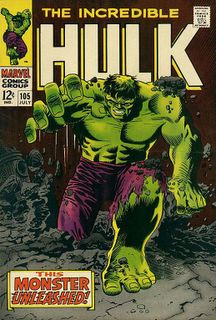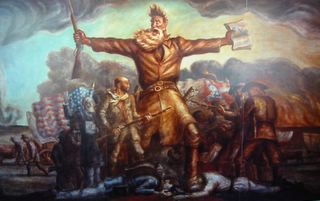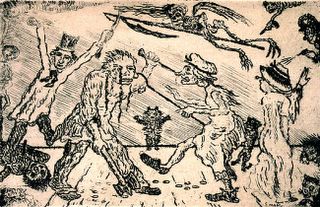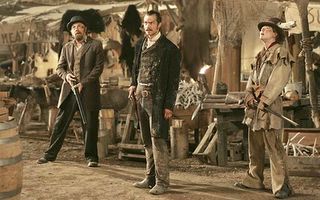
"Patience wavers just so much as/Mortal grief compels, while touches/Quick and hot, of anger, rise/To smitten cheek and weary eyes."
Samuel L. Jackson, Ezekiel 25:17.
Cat Stevens, I'm Gonna Get Me a Gun.
Mission of Burma, That's When I Reach For My Revolver.
The Clash, Hate and War.
Lizzie Miles, I Hate a Man Like You.
Eleventh Dream Day, Murder.
Marvin Gaye, Anger.
Pete Rock & C.L. Smooth, Anger in the Nation.
This is a sadly appropriate choice of sin for this morning. My prayers and condolences to the people of the UK.
Anger is everywhere--the salt in the blood. Anger, in its time, has conquered every nation, every province, seemingly every house. Envy and pride's fervid ambassador, anger spurs the stupid drunken fight at the corner bar, the terrorist detonating a bomb, the gunman in the office, the loud, crude voice behind you at the stop sign. Its victims are innumerable--the child who flinches when her father gets up from the table, the cringing dog, the toe-tagged corpse.
A popular modern incarnation of anger is the (usually American) sport of someone grabbing a gun and taking out his petty grievances and disappointments by shooting random people. Cat Stevens' "I'm Gonna Get Me A Gun" sums the mindset up: "You'll see the best of me," our merry psychotic tells us. "When I...have got...a gun!" ("Get Me a Gun", Stevens' 1967 follow-up to "I Love My Dog", is one of the strangest pop songs of the 1960s--a happy kid singing about murder, set to a jaunty arrangement out of a Disney movie score. (On Matthew and Son.))

Or take the Mission Of Burma's "That's When I Reach for My Revolver," where the singer's world has gone to smash, and a gun's all that's left for him to talk with. On 1981's Signals, Calls and Marches.
Righteous rage
Anger is the only sin of the seven that usually gets a pass--it has been enlisted, since human civilization began, on the side of the powerful and the righteous. It is akin to fire--it warms, it's essential for life, it burns and kills. It has always been on our side, and on the gods'. The first word in the Iliad, Western civilization's opening line, is Μηνιν ("mēnin"), wrath.
"Sing, goddess, the wrath of Peleus’ son Achilleus
And its devastation, which put pains thousandfold upon the
Achaians…[who] gave their bodies to be the delicate feasting
Of dogs, of all birds..”
And then there is Yahweh, the God of the Old Testament, perhaps the angriest, most frustrated and vengeful god in the cosmos. Yahweh seems permanently pissed off throughout the early books of the Bible--throwing Adam and Eve out of paradise and condemning them to pain, age and death; knocking down the Tower of Babel; destroying Sodom and Gomorrah; at last growing weary of the entire human race and drowning the whole world but for one favored family.
And He is given to blood-curdling threats via His prophets. “Therefore will I also deal in fury: mine eye shall not spare, neither will I have pity; and though they cry in mine ears with a loud voice, yet I will not hear them” (Ezekiel 8:18); “I will tread them in mine anger, and will trample them in my fury" (Isaiah 63:3); “Who knoweth the power of thine anger? Even according to thy fear, so is thy wrath (Psalm 90:11). Samuel Jackson's killer Jules, in Pulp Fiction, offers his own take on an Ezekiel verse (ghost-written by Quentin Tarantino) as a preamble to executing someone.

After centuries of retirement, when his gentler son took over the family business, the Old Testament God returned with a vengeance during the settlement of North America as the Puritans, confronted with a fearsome wilderness whose native peoples were seen as, alternately, threats or obstacles, found more need for the smiting Yahweh of the Old Testament than the forgiving, embracing Christ of the New.
The Reverend Jonathan Edwards, in his Sinners in the Hands of an Angry God, describes a deity who has simply had it with we pathetic fallen humans, to the point of bloodlust. “He will crush you under His feet without mercy; He will crush out your blood, and make it fly and it shall be sprinkled on His garments, so as to stain all His raiment. He will not only hate you, but He will have you in the utmost contempt: no place shall be thought fit for you, but under His feet to be trodden down as the mire of the streets.”

In another passage Edwards says the bow of God’s wrath is bent, and the arrow is on the string, aimed right at you, “and it is nothing but the mere pleasure of God, and that of an angry God…that keeps the arrow one moment from being made drunk with your blood.” (In a sad unconscious parody of these sentiments, Oliver North was at the Kuwaiti border on the first day of the Iraq invasion, telling Fox News “The sword…is unsheathed. The blade…stands ready.”)
And in the Civil War anthem, Julia Ward Howe's Battle Hymn of the Republic, the Lord is leading a regiment marching through the South; in one of the lesser-known verses, Christ finally turns up, “in the beauty of the lilies, Christ was born across the sea", so not only was Christ apparently absent from the United States' founding, but he’s peacefully sitting amongst the flowers while his father goes about setting things to right.
Centuries of this sort of thing makes for a grim little world. In 1977, the Clash surveyed the landscape and recorded "Hate and War". The punk in this song is just floating with the current. ("And if I get aggression/I give 'em two time back"). On The Clash.
Kinder murders
Like envy, anger flourishes at home. You can hear it in Lizzie Miles' voice, confronting her no-good man with the sort of weariness that anger can kindle into blood rage. The man had better watch himself--it reminds me of the narrator of the Persuaders' "Thin Line Between Love and Hate", who cats around on his woman until one day he wakes up in a hospital bed, "bandaged from feet to head." (Miles' 1929 song, written by Jelly Roll Morton, is on this compilation.)
Or in "Murder", in which a couple's relationship has clarified into a sort of communal anger that isn't going to end well for either party. Eleventh Dream Day is one of my favorite bands of the 1990s--this is off one of their best records, 1993's El Moodio (out of print, but easily available.)

Here's a bonus bit of familial rage, "I Hate Your Kid", found on Hammell on Trial's website.
Bad for the heart

Have you ever seen pure anger? Walking down 22nd St. one night, I stumbled into a brutal bar fight in which one drunk lout had decided to take on two waiters. The waiters, their smocks stained with blood from their shattered noses, were trying to get at the lout, while his desperate friends were trying to him pull away from the fray. The lout's face was blood-smeared, fevered, glassy eyed, his features were twisted in rage (he looked like a gored bull)--it was terrifying. If he had had a gun, he'd have used it.
(This sort of thing is why I stopped going to baseball games at Yankee Stadium--it seemed like whenever I went, wherever I sat, some drunken fight broke out near me..)
In "Anger", Marvin Gaye sings of rage's toxicity: Anger ages you, makes you ill, destroys your soul. "Up and down my back, my spine, in my brain..It injures me." On Marvin's bitter divorce album, 1978's Here My Dear.
The Roman philosopher Seneca wrote one of the finest works on anger, in which he disputes the notion that people simply lose control and submit to a sort of mindless devil anger inside them. Rather, he says anger “undertakes nothing on its own, but only with the mind’s approval. To receive an impression of wrong done to one, to lust for retribution, to put together the two propositions that the damage ought not to have been done and that punishment ought to be inflicted, is not the work of a mere involuntary impulse.”

In perhaps the finest passage in the essay, Seneca laments anger’s ruinous cost: “ No plague has cost the human race more…cities of greatest renown, their very foundations now scarcely discernible--anger has cast them down; deserts, mile after mile without inhabitant–anger emptied them.” As for the leaders who profited from anger in the short term, their fates are all the same: “anger made one the bleeding victim of his parricide son, told another to expose his royal throat to the hand of the slave…look upon gathered throngs put to the sword, on the military sent in to butcher the populace en masse.”
Fire this time
Anger is neccessary, of course, even vital at times. Much of the great changes of the modern world--the civil rights movements, the abolition of slavery, the rise of democracies--were owed to the work of seriously angry people.
And who would begrudge anger to people who truly deserve to use it? In the early 1960s, James Baldwin and some friends were at a bar in O'Hare Airport, "all of us well past thirty, and looking it." The racist bartender refuses to serve them because, he says, the men look "too young." "It took a vast amount of patience not to strangle him...when it was over, the three of us stood at the bar trembling with rage and frustration." (From The Fire Next Time.)

Aristotle mapped out five conditions for anger: the right person, right degree, right time, right purpose, right way. And here, Pete Rock tackles the problem his own way, in "Anger in the Nation." On 1992's Mecca and the Soul Brother.
No comments:
Post a Comment